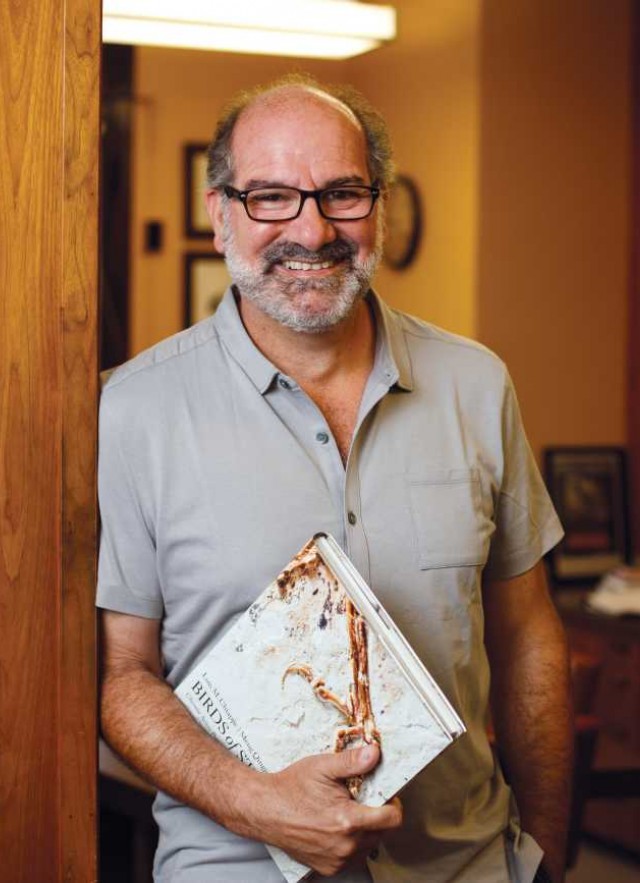press release
November 26, 2019 (Los Angeles, CA) — Dr. Luis M. Chiappe, Senior Vice President of Research & Collections and Gretchen Augustyn Director of the Dinosaur Institute at the Natural History Museum of Los Angeles County (NHM) and adjunct professor in the USC Dornsife College, has been named a Fellow of the prestigious American Association for the Advancement of Science (AAAS).
As part of the AAAS section on Biological Sciences, Dr. Luis M. Chiappe has been elected as an AAAS Fellow by his peers for his distinguished contributions to the field of paleontology, particularly for the origin and early evolution of birds.
“This feels great!,” Chiappe said, upon learning he’d been selected as an AAAS fellow. “It’s a big honor and it builds the reputation of the Natural History Museum and USC. Together, we’ve been building a lot of expertise in paleoscience, which makes us very well positioned to understand the history of life on Earth.”
Chiappe is known for discovering the largest sauropod nesting sites in Patagonia in 1997. He also curated the award-winning Jane G. Pisano Dinosaur Hall exhibition at the Natural History Museum of Los Angeles County, among other distinctions.
This year 443 members around the world have been awarded this honor by AAAS because of their scientifically or socially distinguished efforts to advance science or its applications. New Fellows will be presented with an official certificate and a gold and blue (representing science and engineering, respectively) rosette pin on Saturday, 15 February from 8:00 a.m. to 10:00 a.m. Pacific Time at the AAAS Fellows Forum during the 2020 AAAS Annual Meeting in Seattle, Washington.
This year’s AAAS Fellows will be formally announced in the AAAS News & Notes section of the journal Science on 29 November 2019.
The tradition of AAAS Fellows began in 1874. Currently, members can be considered for the rank of Fellow if nominated by the steering groups of the association’s 24 sections, or by any three Fellows who are current AAAS members (so long as two of the three sponsors are not affiliated with the nominee’s institution), or by the AAAS chief executive officer. Fellows must have been continuous members of AAAS for four years by the end of the calendar year in which they are elected. The AAAS Fellow honor comes with an expectation that recipients maintain the highest standards of professional ethics and scientific integrity.
Each steering group reviews the nominations of individuals within its respective section and a final list is forwarded to the AAAS Council, which votes on the aggregate list.
The Council is the policymaking body of the Association, chaired by the AAAS president, and consisting of the members of the board of directors, the retiring section chairs, delegates from each electorate and each regional division, and two delegates from the National Association of Academies of Science.
AAAS encourages its sections and Council to consider diversity among those nominated and selected as Fellows, in keeping with the association’s commitment to diversity, equity and inclusion.
The Natural History Museums of Los Angeles County (NHMLAC) include the Natural History Museum, La Brea Tar Pits, and the William S. Hart Museum. They operate under the collective vision to inspire wonder, discovery, and responsibility for our natural and cultural worlds. The museums hold one of the world’s most extensive and valuable collections of natural and cultural history—more than 35 million objects. Using these collections for groundbreaking scientific and historic research, the museums also incorporate them into on- and offsite nature and culture exploration in L.A. neighborhoods, and a slate of community science programs—creating indoor-outdoor visitor experience that explore the past, present, and future.
The American Association for the Advancement of Science (AAAS) is the world’s largest general scientific society and publisher of the journal Science, as well as Science Translational Medicine; Science Signaling; a digital, open-access journal, Science Advances; Science Immunology; and Science Robotics. AAAS was founded in 1848 and includes more than 250 affiliated societies and academies of science, serving 10 million individuals. Science has the largest paid circulation of any peer-reviewed general science journal in the world. The nonprofit AAAS is open to all and fulfills its mission to “advance science and serve society” through initiatives in science policy, international programs, science education, public engagement, and more. For additional information about AAAS, see www.aaas.org.
MEDIA CONTACTS
Sally Marquez, NHMLAC
213.763.3580
smarquez@nhm.org
Tiffany Lohwater, AAAS
202.326.8737
media@aaas.org
